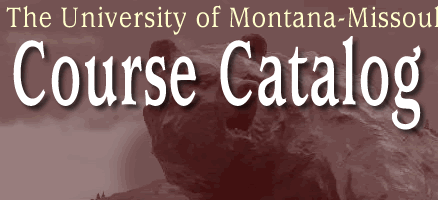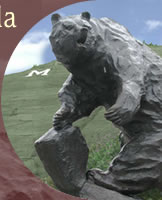The Montana University System
The following statement was adopted by the Board of Regents
in July 1999.
Mission
The Montana University System serves the citizens of Montana
and the public good through a diverse community of scholars
and learners. Representing a rich academic tradition, this community
prepares graduates who are inquisitive, productive, and contributing
citizens not only in the state but also in the larger world
community. To this end and in fulfillment of its mission the
Montana University System will
Philosophically
-Exercise proper stewardship of the public trust and remain
sensitive to its civic responsibility.
-Accord priority to student learning and success, quality in
instruction, research and public service programs, and efficient
and effective use of taxpayers' investment in public higher
education.
-Embrace the principle of academic freedom exercised in the
context of academic responsibility toward students and the larger
community.
-Acknowledge the importance of discovery to the advancement
of society and promote a learning environment that fosters critical
thinking and inquiry both within and across disciplines.
-Expect campuses to meet their civic duty and exercise leadership
by serving as educational, cultural, and economic development
resources within their communities, regions and the State.
Educationally
-Develop an informed, educated and culturally aware citizenry
that is prepared to meet the challenges of the 21st century,
engage in life-long learning, and lead productive lives in
an increasingly diverse and global society.
-Serve students of all ages and from all walks of life and all
Montana cultures by providing a wide range of educational experiences
at the non-credit, certificate, associate, baccalaureate, master's,
specialist and doctoral levels both on the MUS campuses and
through distributed learning strategies.
-Emphasize student success, treat all students with the respect
they deserve, and provide them with the services they need to
be successful.
-Foster a climate where students take responsibility for their
own learning and engage in both active and collaborative learning
experiences.
-Promote programs of study that combine theory and practice,
research and service, along with hands-on and creative activities.
-Encourage all members of the university community to explore
and develop international and interdisciplinary perspectives
in their programs and activities and to understand the power
and influence of globalization.
-Use outcomes assessment to validate student achievement and
acquisition of essential skills, e.g. excellent communication
skills, facility in use of technology, ability to solve problems,
capacity to work in teams.
-Involve students in the full range of college and university
activities (research, instruction, administration, public service,
etc.) To enhance their learning experiences.
Operationally
-Enact policies that promote greater efficiency and effectiveness
in university system programs, activities, and operations.
-Remain steadfastly committed to the public good while relying
upon a wide range of both public and private funding and support.
-Provide academic opportunities to the citizens of Montana when
and where they need them and at a price they can afford.
-Pursue an approach that is market oriented and customer driven,
while maintaining a service orientation toward both students
and citizens in its management and operations.
-Expand the use of information technology to advance student
learning, increase access to educational services, and improve
the management of resources.
-Engage in collaborative relationships with business, industry,
community, government and other educational entities to promote
the common good and to advance learning.
The University of Montana
back to top
Mission
The University of Montana capitalizes on its unique strengths
to create knowledge, provide an active learning environment
for students, and offer programs and services responsive to
the needs of Montanans. The University delivers education and
training on its four campuses and through telecommunications
to sites inside and outside of Montana. With public expectations
on the rise, the University asks its students, faculty, and
staff to do and accomplish even more than they have in the past.
The dedication to education for and throughout life reflects
the commitment to service learning and community building on
and off the campuses. The University enhances its programs through
continuous quality review for improvement and remains fully
accountable to the citizenry through annual audits and performance
evaluations.
The University of Montana-Missoula
back to top
Mission
The mission of The University of Montana-Missoula is the pursuit
of academic excellence as indicated by the quality of curriculum
and instruction, student performance, and faculty professional
accomplishments. The University accomplishes this mission, in
part, by providing unique educational experiences through the
integration of the liberal arts, graduate study, and professional
training with international and interdisciplinary emphases.
Through its graduates, the University also seeks to educate
competent and humane professionals and informed, ethical, and
engaged citizens of local and global communities. Through its
programs and the activities of faculty, staff, and students,
The University of Montana-Missoula provides basic and applied
research, technology transfer, cultural outreach, and service
benefitting the local community, region, state, nation and the
world.
Vision Statements
In pursuit of its mission, The University of Montana-Missoula
will:
1) Educate students to become ethical persons of character and
values, engaged citizens, competent professionals, and informed
members of a global and technological society.
2) Increase the diversity of the students, faculty, and staff
for an enriched campus culture.
3) Attain the Carnegie Commission status of Doctoral Research-Extensive
University by 2005-50 or more doctorates annually in at least
15 fields-and increase funded research to $50,000,000 annually
by 2005.
4) Develop more partnerships-especially with local communities,
businesses and industries, public schools, community and tribal
colleges, state and local governments and universities abroad-and
expand the training and technology transfer programs to promote
community and economic development.
5) Develop the capability and infrastructure for use of information
technology to increase the efficiency and productivity of the
campus and the state; and
6) Involve and engage the faculty, staff, students, alumni,
partners, and friends of the University in institutional governance.
Accreditation
back to top
The University of Montana-Missoula is fully accredited by the
Northwest Association of Schools and Colleges.
Many of the professional schools and departments have the approval
of appropriate accrediting organizations, also. The Department
of Art is accredited by the National Association of Schools
of Art and Design (NASAD); all programs of the School of Business
Administration are accredited by the American Assembly of Collegiate
Schools of Business; the Chemistry Department's Bachelor of
Science program is approved by the American Chemical Society;
computer science is accredited by the Computing Accreditation
Commission (CAC) of the Accreditation Board for Engineering
and Technology, Inc. (ABET); drama is accredited by the National
Association of Schools of Theater at the undergraduate and graduate
levels; all programs preparing licensed school personnel though
the School of Education are fully accredited by the Montana
Board of Public Education and the National Council for Accreditation
of Teacher Education at the undergraduate and graduate levels;
the athletic training option in the Health and Human Performance
Department in the School of Education is accredited by the Commission
on Accreditation of Allied Health Education Programs; the food
service management program is accredited by the American Culinary
Federation Educational Institute Accrediting Commission; the
forest resources management program is accredited by the Society
of American Foresters; the School of Journalism is accredited
by the American Council on Education in Journalism and Mass
Communications; the School of Law has approval of both the Association
of American Law Schools and the American Bar Association; the
Legal Assisting program is approved by the American Bar Association;
the Department of Music is fully accredited at the undergraduate
and graduate levels by the National Association of Schools of
Music; the School of Pharmacy is a member of the American Association
of Colleges of Pharmacy, the baccalaureate program is accredited
by the American Council on Pharmaceutical Education and the
entry-level Doctor of Pharmacy program has been granted candidate
accreditation status by the American Council on Pharmaceutical
Education, 311 West Superior St, Suite 512, Chicago, IL 06010,
(312) 664-3575, (800) 533-3606, Fax (312) 664-4652; the Bachelor
of Science in Physical Therapy is accredited by the Commission
on Accreditation in Physical Therapy Education of the American
Physical Therapy Association; this agency has also granted Interim
Accreditation to the Master of Science degree in Physical Therapy;
the practical nursing program is approved by the Montana Board
of Nursing; the graduate program in clinical psychology is accredited
by the American Psychological Association; the recreation management
program is accredited by the Parks, Recreations, and Leisure
Services Education Council on accreditation sponsored by the
National Recreation and Parks Association in cooperation with
the American Association for Leisure and Recreation; the respiratory
care and surgical technology programs are accredited by the
Commission on Accreditation of Allied Health Education Programs;
and the baccalaureate program in social work is accredited by
the Council on Social Work Education.
The University of Montana-Missoula is fully accredited by the
American Association for Accreditation of Laboratory Animal
Care.
University
Officers back to top
June 2001
Board of Regents of Higher Education
|
Ed Jasmin (Vice hair)...................................................................................................
Jessica Kobos (Student egent).....................................................................................
Lynn Morrison-Hamilton.............................................................................................
Richard Roehm...........................................................................................................
Margie Thompson Chair).............................................................................................
Mark Semmens...........................................................................................................
Richard Crofts, Commissioner of Higher Education .....................................................
Linda McCulloch, Superintendent of Public Instruction ................................................
Judy Martz, Governor ................................................................................................
Local Executive Board
Arlene Breum..............................................................................................................
Sam Roberts, COL (R) ..............................................................................................
Leonard Landa............................................................................................................
|
Bigfork
Missoula
Havre
Bozeman
Butte
Great Falls
ex officio
ex officio
ex officio
Missoula
Missoula
Missoula |
|
Administrators
George M. Dennison, Ph.D.
President
Lois Muir, Ph.D.
University Provost and Provost and Vice President for
Academic Affairs-Missoula
Barbara B. Hollmann, Ph.D.
Vice President for Student Affairs
David Aronofsky, J.D.
Legal Counsel
Rosi Keller, B.S. (Interim)
Vice President for Administration and Finance
T. Lloyd Chesnut, Ph.D.
Vice President for Research and Development and
Graduate Studies
Academic Officers
Sharon E. Alexander, Ed.D.
Center for Continuing Education
Betsy Wackernagel Bach, Ph.D.
Assistant Provost for Retention and Enrollment
Management
Philip T. Bain, Ph.D.
Registrar
Jerry E. Brown, Ph.D.
School of Journalism
Perry Brown, Ph.D.
School of Forestry
Frank D'Andraia, M.L.S.
Library Services
E. Edwin Eck II, J.D.
School of Law
Gerald A. Fetz, Ph.D.
Davidson Honors College
David S. Forbes, Ph.D.
School of Pharmacy and Allied Health Sciences
Larry D. Gianchetta, Ph.D.
School of Business Administration
Shirley Howell, D. A.
School of Fine Arts
Dennis Lerum, Ed.D.
College of Technology
Lois Muir, Ph.D.
Provost
Donald L. Robson, Ed.D.
School of Education
John F. Schwaller, Ph.D.
Associate Provost
Thomas Storch, Ph.D.
College of Arts and Sciences
David Strobel, Ph.D.
Graduate School
Philip West, Ph.D.
Mansfield Center
|
|



